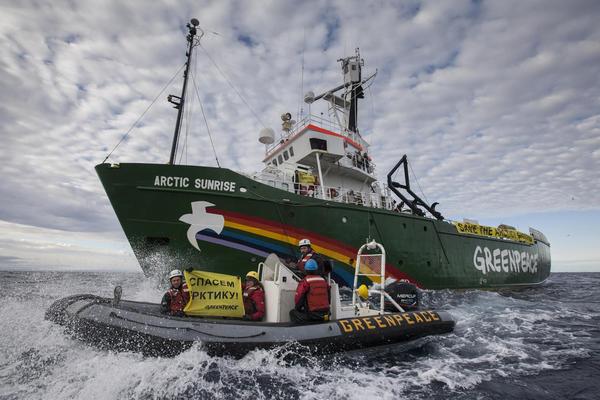Last month, 30 members of a Greenpeace activist crew were arrested by the Russian Coast Guard after trying to stage a protest against the first-ever oil drilling in the Arctic. They've been sitting in a Russian jail ever since.
It all started on September 18th when two activists tried to hang a "Save the Arctic" banner on the state-owned Gazprom Prirazlomnaya platform, which has plans to drill in 2014 in a region surrounded by natural areas and wildlife preserves. The activists were detained, but it didn't end there. A day later the Russian Coast Guard boarded the Greenpeace vessel, Arctic Sunrise, to arrest the other 26 activists and 2 journalists.
They have since been brought to the Russian city of Murmansk where they were charged with piracy and denied bail. In Russia, a piracy sentence can imprison a felon for up to fifteen years. Greenpeace feels that this accusation is out of line and all the activists pleaded not guilty to the charges. The environmental group sought the attention of Russian leader Vladimir Putin, who said that the activists are “obviously not pirates,” but did violate Russian law. Other nations including Argentina, Ukraine and Finland have voiced their opinions against Russia's piracy charges, but no official action has been taken.
The second allegation arose a few weeks later, after Russian authorities claim they found illegal drugs and dangerous equipment on the Arctic Sunrise. The Investigative Committee discovered morphine and poppy seeds, which are ingredients used in heroin and opium, aboard the vessel. The Investigative Committee also found “multiple use” equipment with potential military purposes they say could have endangered the lives of the coast guard crew. In response to the drug allegations, Greenpeace released a statement saying that the Russian authorities must be referring to the medical supplies the ship is required to carry under maritime law. A Greenpeace lawyer also added that the equipment found was a sonar device often used on maritime expeditions.
Other controversial pieces of this story fall on the actions of the Russian authorities. First off, they fired warning shots from the oil rig and patrol vessels at the Greenpeace ship after the two activists attempted to board the platform. Second, they illegally boarded the Greenpeace vessel in international waters to arrest the rest of the activist crew, according to the environmental group. The head of Greenpeace International’s Arctic Project felt that this level of force against a peaceful protest is completely disproportionate.
This story shows the unfortunate unraveling of a protest gone wrong. The act of trying to voice a collective opinion in a “peaceful” (albeit dangerous) manner has gotten Greenpeace more than they've bargained for. Many activists across the globe, including 11 Nobel Peace Prize winners, have sent messages to Russia expressing support for the Greenpeace crew and requesting the charges be dropped. Bail appeal hearings for some of the activists have begun , but most remain at the mercy of the Russian justice system. Until then, the international attention drawn to the issue of drilling in the Arctic will serve as a successful result for their activism. But they've paid for it with their freedom.
